10+ SAMPLE Dental Clinic Business Plan
-
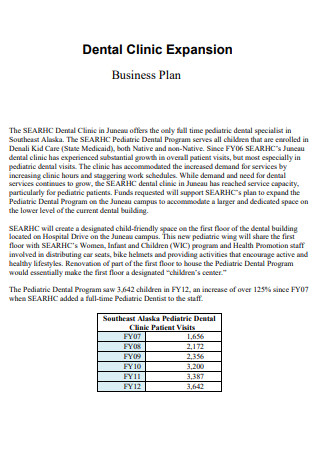
Dental Clinic Expansion Business Plan
download now -
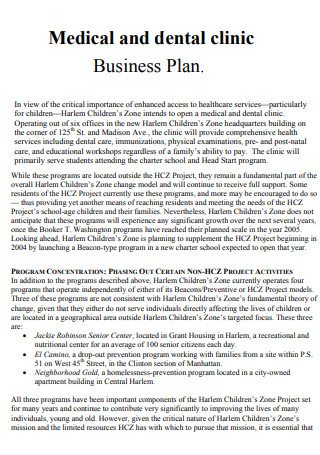
Medical Dental Clinic Business Plan
download now -
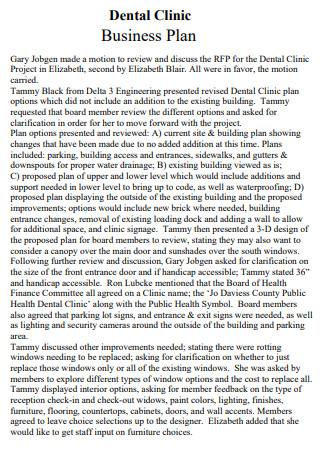
Sample Dental Clinic Business Plan
download now -
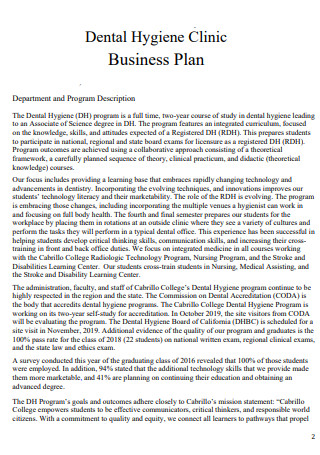
Dental Hygiene Clinic Business Plan
download now -
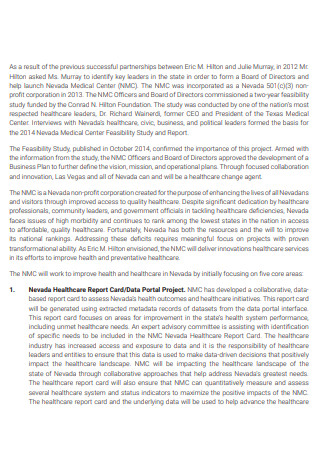
Dental Clinic Business Plan
download now -
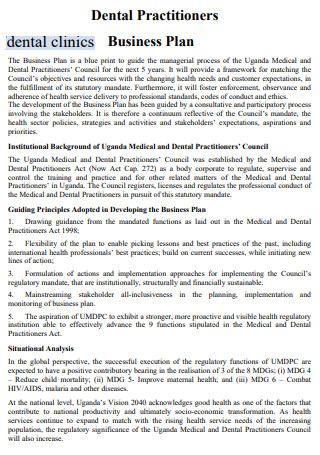
Dental Practitioner Clinic Business Plan
download now -
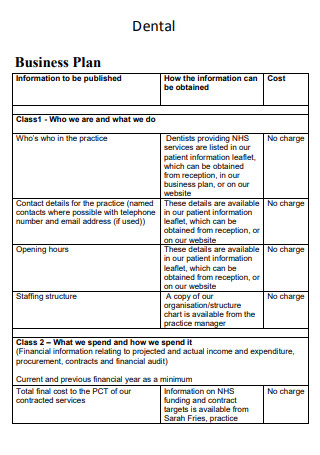
Simple Dental Clinic Business Plan
download now -
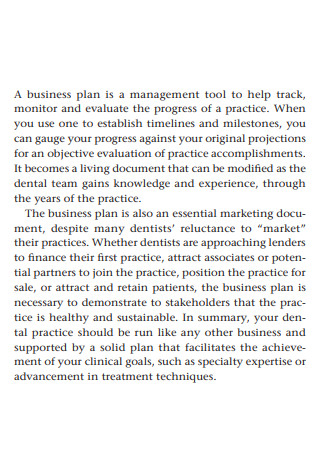
Dental Clinic Analysis Business Plan
download now -
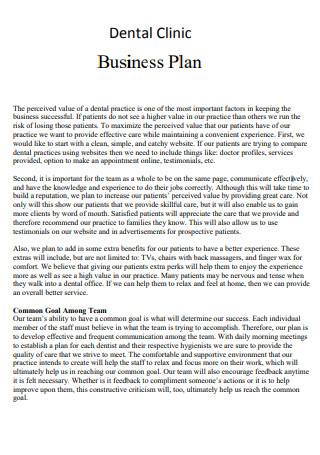
Dental Clinic Business Plan Example
download now -
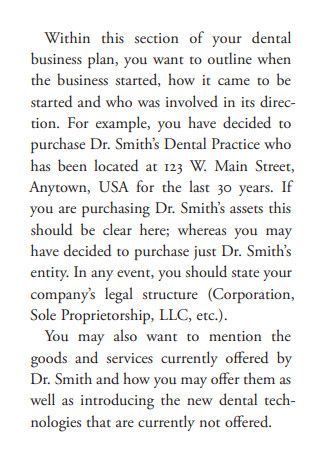
Dental Clinic Business Strategic Plan
download now -
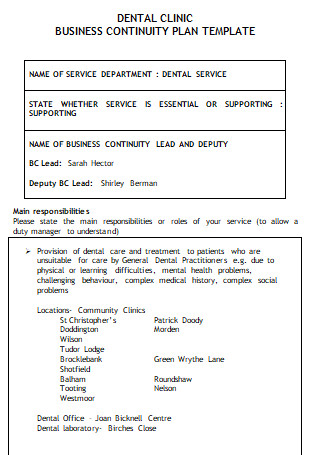
Dental Clinic Business Continuity Plan
download now
FREE Dental Clinic Business Plan s to Download
10+ SAMPLE Dental Clinic Business Plan
What Is a Dental Clinic Business Plan?
Benefits of Owning a Dental Clinic
Tips To Improve the Organization of Your Dental Practice
How To Operate a Profitable Dental Practice
FAQs
What is the profit of dental clinic?
Is dental business profitable?
Can a dentist be an entrepreneur?
What Is a Dental Clinic Business Plan?
Any business, regardless of size, requires a business plan to assist with management. This document will act as a guide and road map for structuring, operating, and expanding your business. If you decide to use your own dental office, you must create a comprehensive dental clinic business plan as this will act as a guide for outlining and achieving your objectives. In addition, it is a management tool that allows you to assess outcomes, make strategic decisions, and demonstrate how your dental clinic will run and expand. It will also force you to determine what you must do and what you must improve along the route. The employment of dentists is expected to increase by 8 percent from 2020 to 2030.
Benefits of Owning a Dental Clinic
Training to become a dentist is a lengthy and labor-intensive procedure. Once you are qualified, you must find a suitable position. Which practice do you plan to join? How will you demonstrate that you are qualified for the job? These obstacles must be overcome, and they can sometimes be a little intimidating. Opening your dental clinic is one of the most acceptable methods to launch a successful dentistry career. Here, we will discuss some advantages of opening your own dental business. Continue reading to learn more.
Tips To Improve the Organization of Your Dental Practice
From the reception desk to the operatory, the organization may make or break the success of a dental business. Maintaining an orderly office facilitates a smoother workflow and enables your staff to execute more efficiently and effectively. Patients will have a more pleasant experience in a tidy, clean office, as it demonstrates that you are competent, in charge, and prepared to deliver exceptional service. Despite these advantages, numerous practices fail to develop and profit from appropriate organizational protocols. Below, we will discuss eight ways to improve the organization of your office so that you may create a better experience for patients and staff.
1. Utilize bins, cassettes, and other containers for instruments.
When there is frequent operatory turnover, it can be challenging to maintain a timetable. Per patient, operatory disassembly and setup might take several minutes, which can build up during a busy day. To maximize efficiency and maintain team safety, utilize cassettes to gather and transfer instruments to the sterilization area. The tools required for a particular procedure can be safely transported to the operating room in one cassette. Bins and tubs can also be utilized to collect the materials and disposables required for a particular process, increasing the practice’s efficiency.
2. Label equipment and materials
Labeling is crucial in the operating room. Utilize words, colors, and even symbols on supplies and instruments to offer workers easily identifiable visual signals and reduce the time spent searching for goods. Sterilization tape that changes color when exposed to chemical vapor can facilitate the identification of processed equipment. Giving team members the ability to swiftly select the appropriate tools for the job allows them to devote more time to treating patients.
3. Develop and utilize process setup guidelines
Creating clear and consistent organizational protocols is also essential for enhancing performance. Creating procedural preparation sheets for the operating room is a technique to promote this. These documents should be readily accessible in treatment rooms. They may include textual supply lists and visual instructions to remind employees what is needed for a particular procedure and how it should be organized. This ultimately reduces misunderstanding, conserves time, and streamlines production.
4. Prepare operatory turnover items
The operatory must be cleaned and disinfected between patients as an integral part of infection control and maintaining safe, compliant practice. Organize operatory turnover products like wipes, barriers, and disinfectants to enable this. Ensure that all supplies are easily accessible, within arm’s reach, and in the exact location in each operatory for optimal outcomes. An ergonomic, predictable organization lowers staff stress and confusion while increasing safety and productivity.
5. Keep and identify handpieces and motors.
Handpieces and motors are utilized in the vast majority of dental procedures; therefore, keeping them organized can have a significant and favorable effect on workflow. Consider identifying these devices with a sterilization-safe marker, primarily if they are intended for a specific purpose or process. Establish a designated storage area for these instruments, so team members know where to find and return equipment. The label should specify the date of sterilization, and the most recently sterilized objects should be placed in the back, such that those fixed on previous dates are utilized first. Each of these measures contributes to decluttering and improving safety and productivity.
How To Operate a Profitable Dental Practice
Patients have never had more dental care options. They can conduct a simple Internet search or post a request for recommendations to their social media accounts. This means that running a successful dentistry business boils down to mastering a few essential aspects of the patient experience. Consequently, keeping you top-of-mind for annual cleanings, also known as recurring income, and empowering them to be your best advocates for patient referrals, also known as net new revenue. There are so many ways to boost patient satisfaction with your clinic that we decided to provide you with seven recommendations.
1. Engage your Staff Members
The most successful dental clinics share a common trait: attention to detail. Even in micro-moments, you have the opportunity to deliver a positive patient experience with every interaction. What exactly is a micro-moment? A micro-moment is a brief interaction between a patient and an employee that is practically undetectable. As soon as a patient is in the room, the receptionist smiles and cracks a short joke to help them feel more at ease. These items are not necessarily incompatible with staff training. It all begins with your regular interactions with your team members. Create the micro-moments you want your patients to experience.
2. Embrace Office Culture
Developing a positive and healthy office culture has repercussions on the patient experience. Do you have a mission to give the finest patient care possible? What about a mission aimed at maximizing the employee experience? Some successful dental practices have developed a thriving culture. Employees want to take pride in their profession and look forward to coming to work each day. You can cultivate this by hosting frequent team-building outings or activities, conducting one-on-one meetings with essential employees to inspire them via leadership and assist them in achieving their career goals or establishing an internal culture club.
3. Enhance Your Dental Staff
Choosing the subsequent significant hiring to make might be difficult. Some formulae can determine crucial hires, such as receptionists and dental assistants. There is not always a perfect staffing formula. You may have the ideal ratio on paper, yet you still feel understaffed and overworked. This is more prevalent than you might believe. There are numerous techniques to boost productivity. Most likely, this is due to inefficient business processes, such as obsolete practice management software, inadequate staff onboarding, and the absence of a continuous education strategy. If you provide them with the appropriate resources, your current staff could perform more efficiently.
4. Create a Unique Dental Practice
Think about the top three things that set you apart from your top competitors. Can you describe them easily? If you said “no,” you should get to work. You might have high-tech imaging tools that help you take better care of your patients. You could quickly put information like this at the center of your marketing efforts. By doing this, you’re saying that you’re putting money into your practice, which means you’re putting money into the health of your patients.
5. Use working hours to your advantage.
There are limited hours in a workday. Maximizing team productivity and bookings are crucial. Software plays a significant role in everyone’s workday and may make or break a team’s efficiency. Effectively managing your bookings is another vital aspect of controlling your workday. Creating patient policies that require 24-hour cancellation warnings, fee schedules for missed appointments, or more flexible hours to accommodate patients in the early morning or evening will help you and your employees utilize your time.
6. Adopt Scheduling Applications That Are Easy to Use
So what exactly does user-friendly mean? A user-friendly experience can be either positive or negative while engaging with technology. This is particularly crucial if you allow your patients to arrange their appointments online. If patients can locate your clinics online and book an appointment immediately, you have just acquired a new patient without ever picking up the phone! The cloud-based software from Denticon enables your patients to make appointments online. You determine the filters, and they choose a convenient time. After requesting a meeting, the patient will automatically receive a confirmation email containing your office’s contact information and directions.
7. Automatize your Invoicing Office
Now that the service has been delivered, it is time to receive payment. Easy, correct? Not always is this the case. Finding patients to pay their co-payments and processing insurance claims may be burdensome and costly. This procedure can be streamlined by automated billing, allowing you to be delivered faster, allowing your team to focus on other parts of the business, and giving you a bit more peace of mind.
[/ns_col]
FAQs
What is the profit of dental clinic?
The average dental practice has a 40 percent gross profit margin. Even though other factors could alter your margins, this number should serve as a baseline. Additionally, knowing your profit margin for each treatment can be helpful.
Is dental business profitable?
The usual range of profitability for a general dentistry practice is between 30 and 40 percent of revenues. However, this number can be deceivingly tricky to calculate. Numerous practice expenses listed on tax returns or P&L statements must be modified to ascertain the practice’s true profitability.
Can a dentist be an entrepreneur?
Dentists could have an entrepreneurial attitude, but they are not entrepreneurs. By choosing dentistry as a career, dentists have entered a company with a high level of success but limited development prospects.
By implementing the suggestions above, we are convinced that your dental business will stand out from the competition. If you ever like to discuss your business objectives in greater detail. The significance of drafting a business plan for a dental clinic will help your company achieve success and grow. To maintain your dental clinic’s position at the top of the industry, you must immediately initiate creative thinking and strategic business planning.
